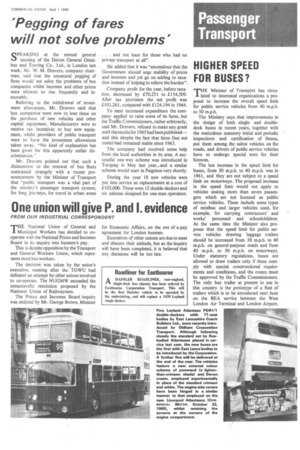'Pegging of fares will not solve problems'
Page 35

If you've noticed an error in this article please click here to report it so we can fix it.
PEAKING at the annual general meeting of the Devon General Omnibus and Touring Co., Ltd., in London last week, Mr. W. M. Dravers, company chairman, said that the unnatural pegging of fares would not solve the problems of bus companies whilst incomes and other prices were allowed to rise frequently and inexorably.
Referring to the withdrawal of investment allowances, Mr. Dravers said that bus companies were now to lose these on the purchase of new vehicles and other capital equipment. Manufacturers were to receive tax incentives to buy new equipment, whilst providers of public transport were to have the investment allowances taken away. "No kind of explanation has been given for this apparently unfair discrimination."
Mr. Dravers pointed out that such a disincentive to the renewal of bus fleets contrasted strangely with a recent pronouncement by the Minister of Transport that "public transport was a vital part of the country's passenger transport system; for long journeys, for travel in urban areas . and not least for those who had no private transport at all".
He added that it was "anomalous that the Government should urge stability of prices and incomes and yet go on adding to taxation instead of helping to relieve the burden".
Company profit for the year, before taxation, decreased by £70,251 to £154,509. After tax provision the net profit was £101,261, compared with £124,194 in 1964.
To meet increased expenditure the company applied to raise some of its fares, but the Traffic Commissioners, rather arbitrarily, said Mr. Dravers, refused to make any grant until the results for 1965 had been published— and this despite the fact that fares (but not costs) had remained stable since 1963.
The company had received some help from the local authorities in its area. A successful one-way scheme was introduced in Torquay in May last year,.and a similar scheme would start in Paignton very shortly.
During the year 18 new vehicles were put into service as replacements at a cost of £102,000. These were 12 double-deckers and six saloons designed for one-man operation.




















































































































